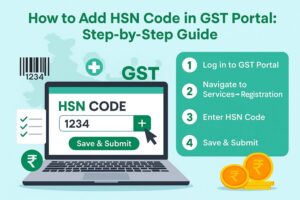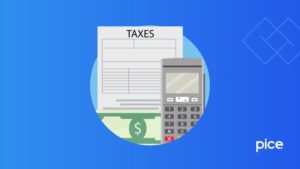GST on Credit Card and Credit Card EMI
- 4 Sep 24
- 8 mins
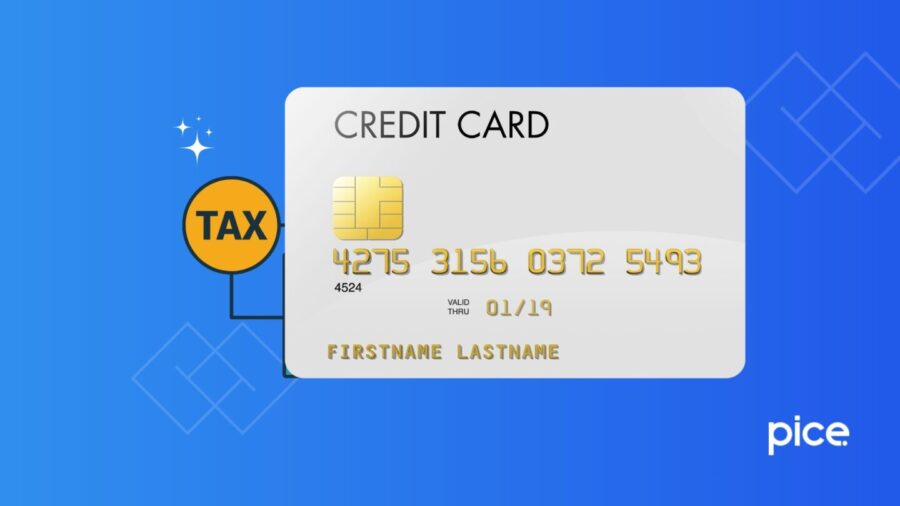
GST on Credit Card and Credit Card EMI
- Scope of Taxation on Financial Transactions, Including Credit Cards
- GST Rate on Credit Card Transactions or GST on Credit Card EMI with SAC Code
- Availability of ITC Claims
- Advance Rulings on GST on Credit Cards
- What Is Credit Card GST Charge vs. Service Tax?
- Myths About the Impact of GST on Credit Cards
- What Is the Impact of GST on Credit Cards?
- Conclusion
Key Takeaways
- GST on Credit Card Transactions: A flat 18% GST applies to various credit card services, including processing fees, EMI interest, and late payment charges.
- ITC Eligibility: Businesses can claim Input Tax Credit (ITC) on credit card-related bank charges, subject to fulfilling conditions under the CGST Act.
- Myth Busting: GST is not applied twice on utility bill payments made via credit cards, and timely EMI payments can help avoid additional GST on financial charges.
- Impact on Costs: The introduction of GST has led to increased interest rates, processing fees, and taxes on rewards and cashback earned from credit card transactions.
- Financial Planning: Understanding GST charges on credit cards can help in better financial management, avoiding unnecessary fines and charges.
Implementing the Goods and Services Tax (GST) laws by the Central Government led to a consolidation of taxes, even in financial services. One such service is the credit card.
Even though the rates and charges vary from one financial institution to another, the GST applicability stays constant. So, if you use this card for your daily transactions, read on to learn about credit card GST charges in detail.
Scope of Taxation on Financial Transactions, Including Credit Cards
There is a multitude of scope for taxation on financial transactions. These include:
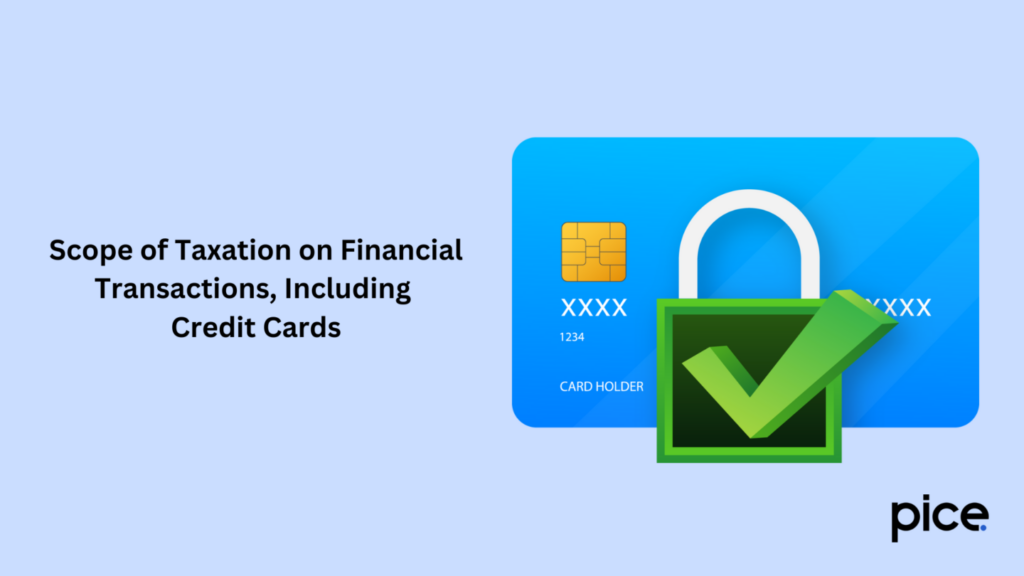
- The government charges GST on credit card transactions only once, irrespective of the payment method.
- After the introduction of GST, the service charges applicable for 15% were increased to 18% tax on payments.
- Even if a credit card holder delays the payments and has to pay a late fine, it will be subjected to an extra 18% as GST, instead of the previous 15%.
- Lastly, if you are paying for your utility bills through your credit card, you will not have to pay any extra GST, as there was when service tax was available on these transactions.
GST Rate on Credit Card Transactions or GST on Credit Card EMI with SAC Code
GST applies to various credit card services, such as over-limit charges, processing fees, credit card EMIs, late payment charges, annual fees and any other fees that your credit card provider levies. You should remember that the SAC code for financial and related services is 9971, during payment of these charges.
Usually, the amount of GST applicable on these charges is 18% of the total amount. You should also note that in the case of credit card EMI payments, you will have to pay 18% GST on the processing fees as well as the interest component. Additionally, if you miss out on the EMI payment, the same GST tax amount will be added to your interest rate.
Availability of ITC Claims
Input Tax Credit allows you to reclaim the tax when selling goods or services that you have already paid on their purchase. As per the rules under Section 17(5) of the CGST Act, you can claim ITC on bank charges, without any hassle.
However, when raising a claim to ITC, you must fulfil the following conditions:
- You can claim ITC only after receiving the actual goods or services.
- It is mandatory to possess documents such as debit notes, tax invoices or other valid tax-paying papers.
- You will have to submit the returns along with other documents under Section 39 of the CGST Act.
- In case of bank charges, you have the complete liberty to pay the tax on goods and services either through ITC or in cash.
Furthermore, you should have an idea of advanced rulings applicable to GST on this card, to get a thorough idea of this topic.
Advance Rulings on GST on Credit Cards
An advance GST ruling refers to a written explanation of the tax legislation available in India. Usually, the tax authorities can issue it to individuals or businesses that are unsure about a specific tax law.
Furthermore, as per GST laws, you cannot treat loans as a financial service. Hence, it does not attract 18% GST when you get a loan. Even the interest charged on it is exempt from taxes and the eligibility criteria for a loan are simple, making it easier to avail.
What Is Credit Card GST Charge vs. Service Tax?
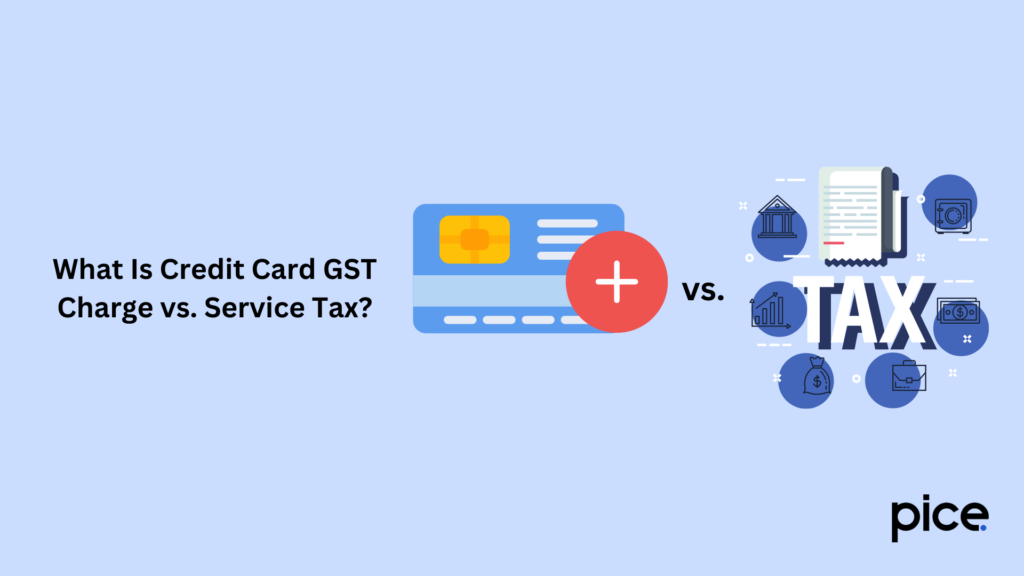
Service charge is a type of indirect law that you had to pay for availing various services before the government introduced the concept of GST. On the contrary, GST is a multistage, comprehensive and destination-based tax, combining various taxes.
Previously, the service charge that you would have to pay on the service value was 15%. However, upon the introduction of GST, the charge rose to 18% on the merchant fees of the cost of the service.
Myths About the Impact of GST on Credit Cards
Since the applicability of GST, there has been a variety of myths associated with the impact of GST on credit cards. Some of these myths include:
- Myth 1: You will not have to pay GST on the interest component of the card bill
Fact: Although GST does not apply to the interest of loans, it does apply to the interest component of credit card statements. Moreover, you will have to pay GST on the processing fee which is applicable for converting your payments using the card into EMIs. The applicable GST gets automatically added to your monthly card costs so you will not have to make a separate transaction for their payment.
- Myth 2: The addition of GST to your EMI increases your credit card bills
Fact: The government levies GST only on the additional financial charges of credit card services you pay such as over-limit charges, late payment charges, etc. So, if you pay your EMIs on time or even before the due date, you can save a substantial GST on it. Also, these additional charges will not be applicable, leading to a reduction in the overall costs of EMIs.
- Myth 3: The utility bill payments using your card leads to twice GST payments
Fact: You should note that under no circumstances will you have to pay GST twice upon your utility bill payment. Even the government clarified that cardholders do not have to pay double taxes on their utility bill amount, irrespective of the payment mode.
Once you are aware of these myths, you can move to the next section of this blog to understand the actual impact of GST on credit cards.
What Is the Impact of GST on Credit Cards?
The following are some notable impacts of the implementation of GST on these cards:
- Rise in the interest rates of credit cards: Upon implementation of GST, cardholders have witnessed a surge in the interest rates of credit cards. This implies that they will have to pay more money as tax than what was applicable when the government levied service tax on financial services.
- Availability of more rewards and cashback: Even GST is applicable on the rewards and cashback that you are getting upon making transactions using this card. Thus, as a credit card user, you will have to pay a considerable amount as tax on the cashback and rewards earned.
- Increase in processing fees of credit cards: Usually, financial institutions charge an additional processing fee to convert transactions into EMIs. Upon the addition of GST, the processing fee increases considerably.
Conclusion
Considering that now you are aware of the credit card GST charges, you can easily calculate the exact amounts you have to pay when maintaining and using them.
This understanding can help you with financial planning as well as ensure that you do not have to pay unnecessary charges in the form of late fines, overdue charges and so on to your financial institution.
💡If you want to pay your GST with Credit Card, then download Pice Business Payment App. Pice is the one stop app for paying all your business expenses.
 By
By 








